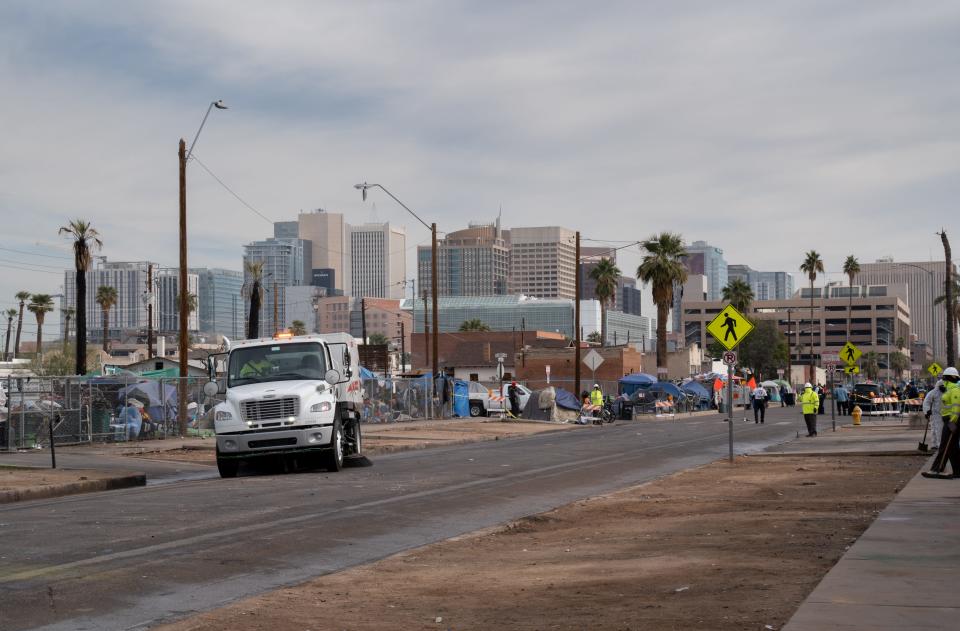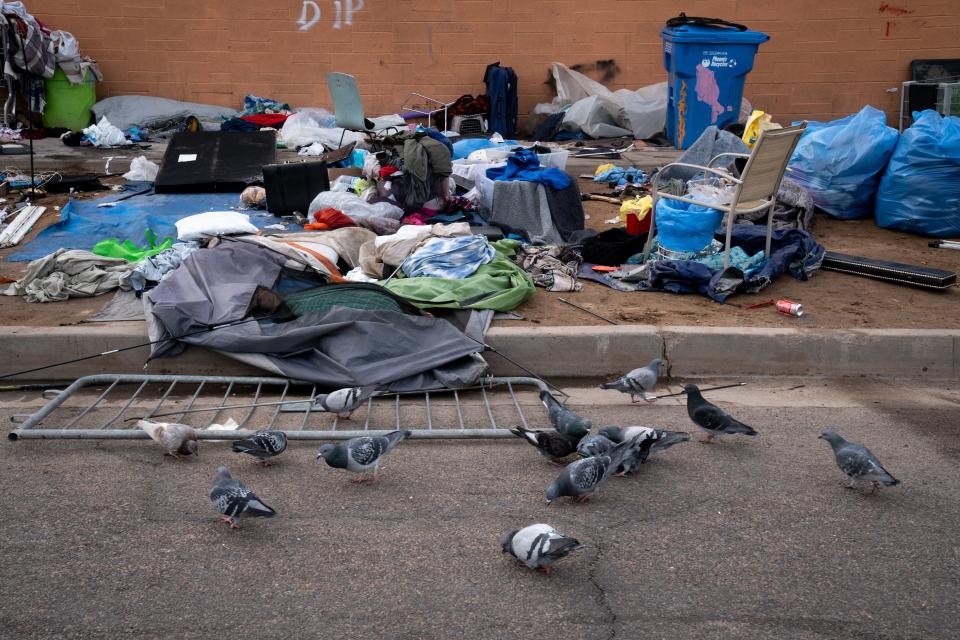Phoenix likely to clear ‘The Zone’ homeless encampment beginning in May
Phoenix has devised a plan for the city’s largest homeless encampment that officials hope will address safety and legal concerns over the area, known as "The Zone," while also helping the people there secure shelter.
The city will clean up and close off the encampment block by block, offering each person an alternative place to stay and other services as it does so, said Rachel Milne, director of Phoenix’s Office of Homeless Solutions.
The closure is likely to begin next month, she said.
Once a block is closed off, it is “quite possible” that police will enforce the closure, Milne said, though she stressed the city will offer shelter and other services first.
The new protocol is an extension of enhanced cleanups the city has conducted in the area since December. The big difference will be that once a block is cleared, people will not be able to return to it, Milne said. Potential shelter options, including hotel rooms, vacant buildings or a structured campground, are still being determined.
The plan comes after a Maricopa County Superior Court judge in March ordered the city to remove tents from the encampment, which is located near 12th Avenue and Madison Street, blocks from the Arizona Capitol complex.
What's in store for Phoenix's future? What the mayor wants you to know
“What I'm happy about the judge's ruling is that it’s actually helped us to intensify those efforts and help accelerate some of the things we’re doing,” Milne said.
The order stemmed from a lawsuit, Brown v. City of Phoenix, between the city and nearby residents and business owners who argue that the encampment is a public nuisance. They said they have witnessed people using drugs, littering and defecating on their properties and that the city hasn’t done enough to stop these and other problems.
An April count found roughly 900 people living in the encampment, Milne said.
Under the March order, the city must show it is making progress on cleaning up The Zone by July 10, when the lawsuit is set to go to trial.

Cleanups successful in getting people into services
Phoenix’s past cleanups have proved successful: Almost 70% of the people the city has engaged with during the five cleanups — 123 individuals — have accepted shelter or other services and have been transported out of The Zone that same day, according to city data.
“A lot of times when I'm out in the community, I hear a lot of people say, ‘People don't want services. People won't go to shelter. People won't accept it.’ And that is just absolutely not what we're finding,” Milne said.
The other 30% have typically returned to the same block after the cleanup ended or moved to another area of the encampment, Milne said.
New Tempe police chief: First thing on new Tempe police chief's agenda: listen
The new protocol will likely take effect during the city’s next enhanced cleanup, scheduled for May 10, she said.
The city typically begins notifying people living in The Zone of a scheduled cleanup two weeks before, and additional outreach is planned for the May 10 cleanup to let people know the block that is cleaned will be closed to camping afterward, Milne said.

City examining options to add shelter space
As the city prepares to launch the new protocol, one big question remains: Where will everyone go?
The city created nearly 600 new shelter beds in 2022 and has plans to add 800 more in the next two years. But there are not yet enough shelter beds available to accommodate everyone in The Zone, Milne said.
The city is “intensely” examining solutions for expanding its shelter space, she said. Possibilities include hotel rooms, vacant buildings and an outdoor shelter space with bathrooms and 24/7 security.
Flagstaff: Motel will become housing for the homeless
Following the March judicial order, the city received an outpouring of offers to help from nonprofits, philanthropic organizations, other government agencies and even hotel owners offering up rooms, Milne said.
“We need to kind of accelerate the things that we’re working on to bring more shelter beds and more safe places available,” she said.
Multiple legal disputes still at play
Beyond Brown v. City of Phoenix, the city faces two other legal disputes over its treatment of unhoused people.
Since 2021, the U.S. Department of Justice has been investigating Phoenix and its police department for several reasons, including whether police unlawfully seize or dispose of unhoused people's belongings.
In November, the American Civil Liberties Union of Arizona sued the city over its treatment of people experiencing homelessness, seeking to halt cleanup sweeps of unhoused people’s belongings and stop police from enforcing ordinances that the lawsuit says "criminalize homelessness.” A settlement of that lawsuit is expected to be finalized within the next few weeks.
Juliette Rihl covers housing insecurity and homelessness for The Arizona Republic. She can be reached at jrihl@arizonarepublic.com or on Twitter @julietterihl.
Coverage of housing insecurity on azcentral.com and in The Arizona Republic is supported by a grant from the Arizona Community Foundation.
This article originally appeared on Arizona Republic: Phoenix plans to clear downtown homeless encampment after court order

